Curriculum Vitae
Book Reinforcement Learning
Book Algorithms with Julia
CAIML
Research
START Project
Publications: Journals
Publications: Conferences
Invited Presentations
Teaching
Clemens Heitzinger's
homepage!
1 New Book Introduction to Digital Humanism Out Soon! (9 November 2023)
Thanks to the editors for their initiative!
2 Article in kma Online (20 October 2023)
kma Online has published the article Wie Blutvergiftungen mit künstlicher Intelligenz geheilt werden könnten about our work on reinforcement learning for sepsis treatments. kma is short for Klinik Management aktuell and the leading magazine for decision-makers in clinics in the D-A-CH area. It publishes news about clinic management, health care, health-care policy, and medical technology.

3 AI against Sepsis Nominated for the futurezone Award 2023 (12 October 2023)
We have been nominated for the futurezone Award 2023 in the category Health Tech, thus being among the three finalists.

4 Austrian Fundraising Congress (10 October 2023)
I was happy to give the keynote on Tuesday at the 30th Austrian Fundraising Congress, talking about the past, present, and future of artificial intelligence.
5 Article in News (6 October 2023)
News, Austria’s largest weekly news magazine, published a 6-page article about artificial intelligence in medicine titled Doktor Digital, featuring our work on reinforcement learning for treating sepsis in intensive-care units.
6 Expedition KI 2.0 (4 October 2023)
On Friday, 4 October 2023, I took part in a panel discussion about the state of AI research with
- Robert Kleedorfer (Kurier, moderator),
- Daniel Naeff (ETH AI Center),
- Matthias Zeppelzauer (FH St. Pölten),
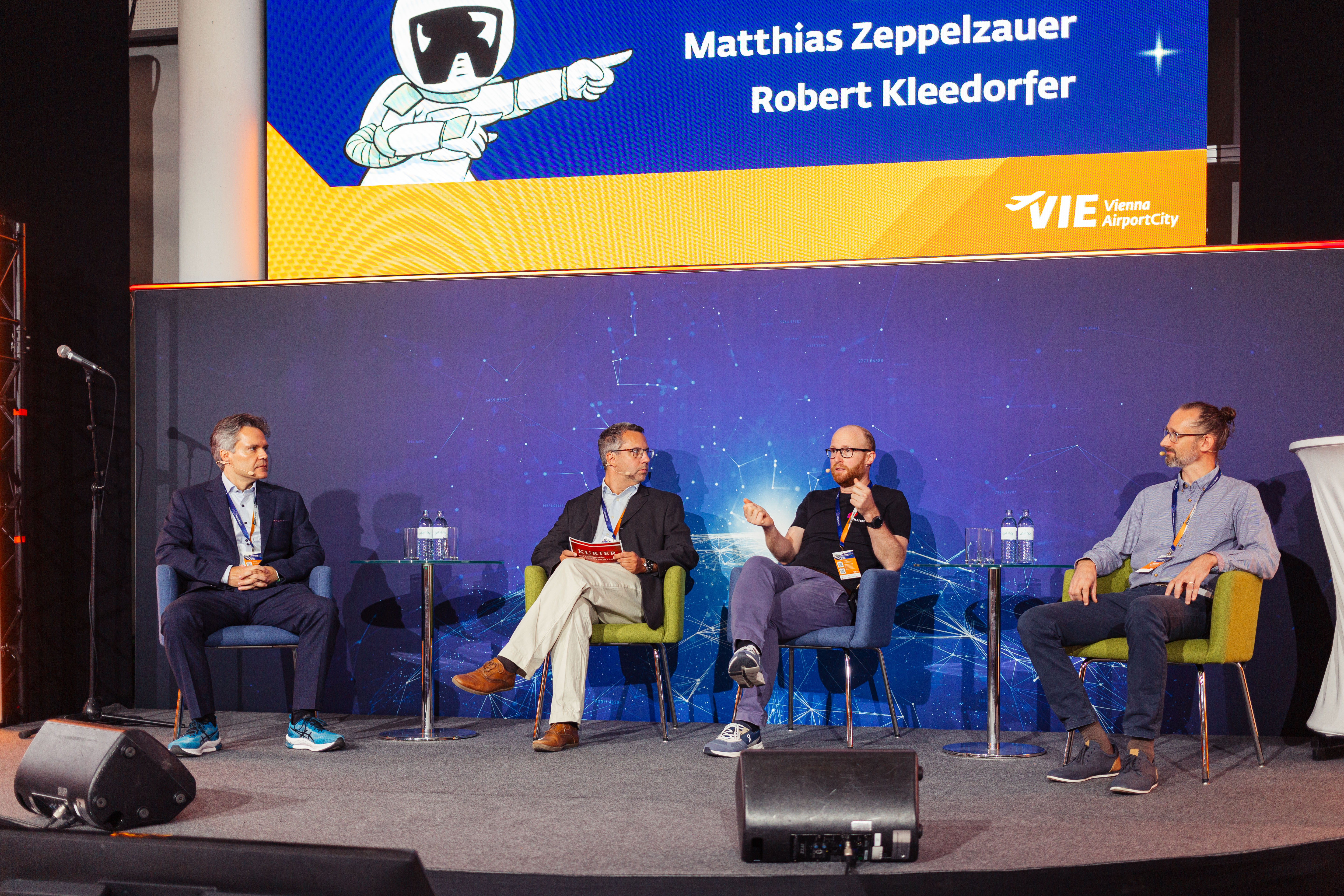
7 Science Talk (25 September 2023)
At the Science Talk on 25 September 2023, I discussed the topic AI – What Can We Still Trust? with
- Univ.-Prof. Mag. Dr. Matthias C. Kettemann, LLM (Institut für Theorie und Zukunft des Rechts, Universität Innsbruck),
- Dr.in Eugenia Stamboliev (Institut für Philosophie, Universität Wien), and
- Dr. Stefan Strauß (Institut für Technikfolgen-Abschätzung, Österreichische Akademie der Wissenschaften).
The invitation can be found here. Some photos are available here.
8 Informatics = Information + Mathematics (1 August 2023)
The Department of Informatics (Computer Science) at TU Wien is ranked #1 in Austria, #4 in the D-A-CH area, #23 in Europe, and #74 worldwide according to the QS University Ranking 2022. I am happy and proud to join the department starting in August, contributing to machine-learning research and focusing on TUW CAIML (Center for Artificial Intelligence and Machine Learning).
9 Comments on Large Language Models Encode Clinical Knowledge at science.orf.at and Interview in Ö1 (13 and 14 July 2023)
I comment on the paper Large Language Models Encode Clinical Knowledge (by Google Research, the National Library of Medicine, and DeepMind) in Ö1 Wissen aktuell (science radio program by the Austrian Broadcasting Corporation ORF) on Friday, 14 July 2023. An accompanying article was published online at science.orf.at on Thursday, 13 July 2023.
10 Newspaper Article in Der Standard (7 July 2023)
Der Standard, one of Austria’s leading newspapers, published a one-page article about my work in reinforcement learning and sepsis treatment on page 11.
- Eine KI berät bei Blutvergiftung (online version)
- Eine KI berät bei Blutvergiftung (print version)
11 First ASAI/CAIML National Summer School in Artificial Intelligence (3–7 July 2023)
The announcement, program, and all details of the First ASAI/CAIML National Summer School in Artificial Intelligence can be found here.
12 Two-Part Interview by medinlive (19 June 2023 and 26 June 2023)
A long two-part interview (in German) about our work on reinforcement learning in intensive-care units and about ethical questions was published by medinlive, the medical information and news website of the Viennese medical association.
- Wenn KI den Weg vorgibt (Teil 1)
- „Ethische Probleme entstehen auch durch Verzicht auf den Einsatz“ (Teil 2)
13 Mayrs Magazin in ORF2 (16 June 2023)
Mayrs Magazin, the science show by ORF (Austrian Broadcasting Corporation) on Fridays at 18:30, brought a segment on generative AI and the current research race with comments by myself on Friday, 16 June 2023.
14 New Initiative by the CAIML SIG Generative AI and Became AI (June 2023)
Generative AI will be the most significant disruption of our lifetimes. It is our obligation as scientists to guide the application and further development of this technology in such a way that it benefits us all.
We are pleased to announce that we have just launched the Became AI platform in collaboration with CAIML at TU Wien and its newly established special interest group (SIG) Generative AI. One of its initiatives is the Became AI Forge, which provides a guided three-months program offering hands-on mentorship and sponsored resources such as API access and cloud GPUs for exploring generative AI.
Besides that, there will be the Became AI Lab bridging science and businesses, where you will be able to apply your learnings from the Became AI Forge to real-world projects with real-world data.
Our big vision is to build an initiative that has an impact beyond individual projects. We want to drive the adoption of generative AI in Austria and also create our own large language model (LLM) in order to become independent from big-tech companies.
As TU Wien is going to offer classes on generative AI starting this fall, there will be the option to have your practical work recognized there.
If you want to join our first batch of the Became AI Forge, please register on our website https://became.ai/ till 15 June 2023 at 23:59. If you have any further questions, please email us at mailto:tuwien@became.ai.
15 Panel Discussion about Generative AI / ChatGPT at Vienna City Hall (5 June 2023)
In a panel discussion moderated by Eva Stanzl, Olga Grjasnowa, Georg Psota, and myself discussed Generative AI, ChatGPT, and their ramifications for our future.
- Introduction: Anita Eichinger, Director Vienna City Library (Wienbibliothek im Rathaus)
- Welcome address: Wolfgang Renner, Wiener Zeitung
- Moderation: Eva Stanzl, Wiener Zeitung, Vorsitzende des Klubs der Bildungs- und Wissenschaftsjournalist:innen Österreichs
- Panel:
- Olga Grjasnowa, Institut für Sprachkunst, Universität für angewandte Kunst Wien
- Clemens Heitzinger, Co-Direktor des Center for Artificial Intelligence and Machine Learning (CAIML), TU Wien
- Georg Psota, Chefarzt der Psychosozialen Dienste Wien
Articles:
- Announcement in Wiener Zeitung: Digitaler Humanismus – Ein Troll fegt durch die Welt – ChatGPT, Mythos trifft Wahrheit trifft Chancen
- Article in Wiener Zeitung (online): Digitaler Humanismus – KI, sagt der “Hausverstand”
- Article in Wiener Zeitung (print): Digitaler Humanismus – KI, sagt der “Hausverstand”
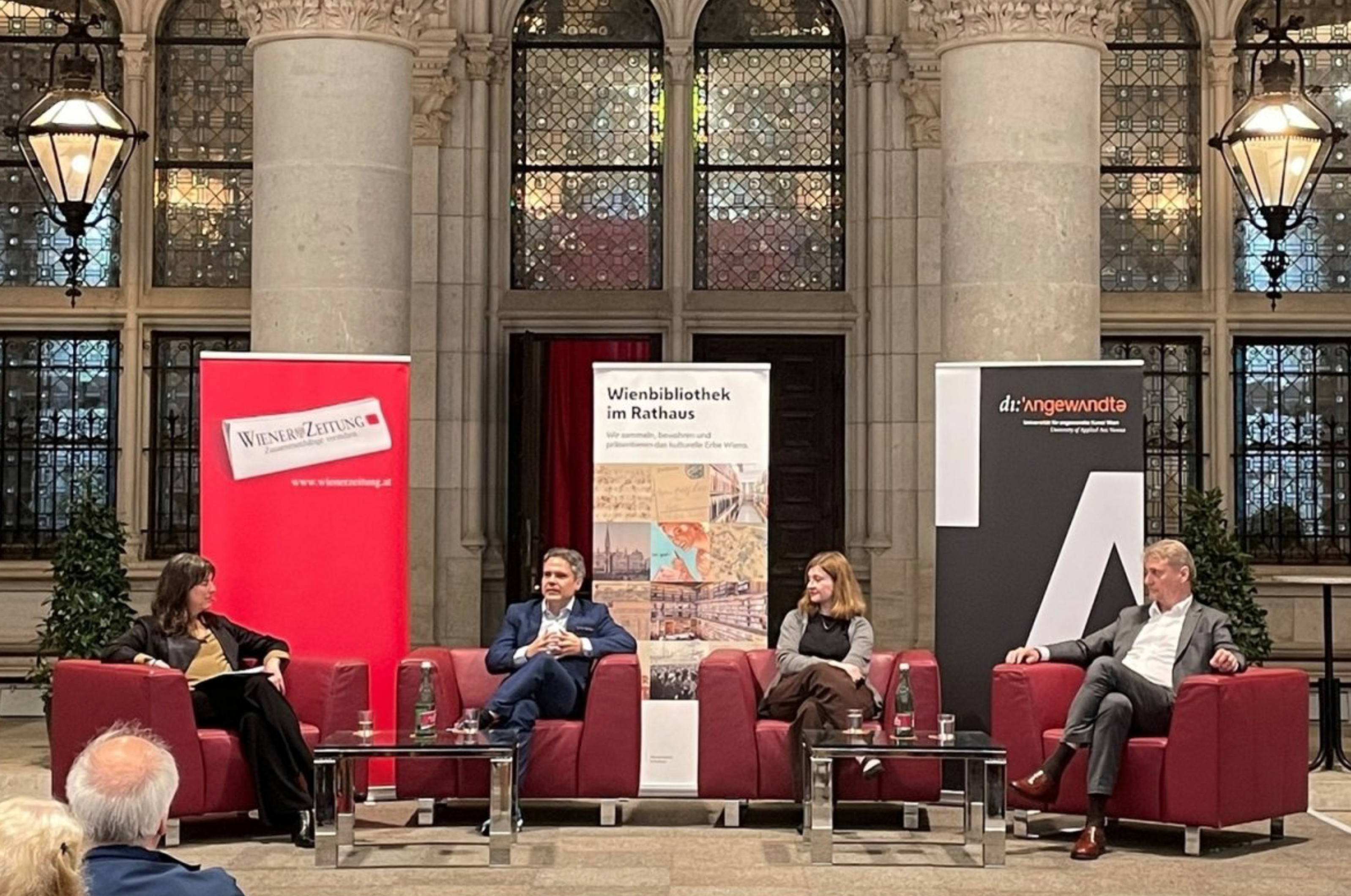
Source: Wiener Zeitung
16 Artificial Intelligence as Life-Saver / Künstliche Intelligenz als Lebensretter (5 June 2023)
We made the headline of Kurier, one of Austria’s leading newspapers, on 5 June 2023: Artificial Intelligence as Life-Saver.
The article on page 19, also available at Future Zone, discusses how we worked on reinforcement learning to calculate optimal treatments.
17 Interview at TUW Live Event (25 May 2023)
The TUW Live event on Future Technologies featured a 20-minute interview about ChatGPT (Large Language Models). You can find the recap here.
18 Media Echo to the Press Release about the AI Doctor
- Article in Science Daily (11 May 2023): Better than humans: Artificial intelligence in intensive care units
- Article at science.orf (Austrian Broadcasting Corporation, 11 May 2023): KI erstellt Behandlungspläne für Blutvergiftung
- Article in Kurier (Austrian newspaper, 11 May 2023): So hilft “Doktor KI” bei der Behandlung einer Blutvergiftung
- Article in medinlive (medical news, published by Ärztekammer für Wien, 11 May 2023): Wie “Doktor KI” Behandlungsschemata erstellt und entlastet
- Radio report in Ö1 Morgenjournal (cultural and news radio channel by Austrian Broadcasting Corporation, 22 May 2023)
- Article in India AI (1 June 2023): AI model’s decision making outperforms humans in intensive care units
19 Press Release by TU Wien (11 May 2023)
A press release by TU Wien features our collaboration with Medical University Vienna. We worked on reinforcement learning to learn optimal sepsis treatments in intensive care. See my publications here and here, also available from my list of publications ([84, 85]).
20 New Research Project Reliable Reinforcement Learning for Sustainable Energy Systems (RELY)
My latest research project Reliable Reinforcement Learning for Sustainable Energy Systems (RELY), funded by FFG’s AI for Green initiative, will start in September 2023.
21 Article in Trend about AI Engineers (17 April 2023)
The article “AI Engineer: Der Job des KI-Ingenieurs” with quotes by myself about the roles of AI engineers was published by the well-known Austrian monthly magazine Trend.
22 Articles in Future Zone and Kurier about ChatGPT and the Job Market (9 March 2023)
The article “Warum ChatGPT so schnell kein Job-Killer ist” with quotes by myself was published by well-known Austrian newspaper Kurier and online magazine Future Zone.
- Article (online) at Future Zone (9 March 2023)
- Article in Kurier (9 March 2023)
23 Café Puls by Puls4 Focuses on ChatGPT from 6 March to 10 March 2023
Puls4, one of Austria’s leading private TV stations, focuses on ChatGPT in Austria’s most popular breakfast TV show Café Puls (5:30–12:00) from Monday, 6 March, to Friday, 10 March 2023, including some statements by myself about how ChatGPT works and possible ramifications.
- 10.3.2023: ChatGPT: Zukunft oder KI-Albtraum?
- 9.3.2023: Kosten uns KI-Systeme künftig Jobs?
- 8.3.2023: Schüler:in oder Künstliche Intelligenz?
- 8.3.2023: Das KI-Experiment im Klassenzimmer
- 7.3.2023: Künstliche Intelligenz macht Schule
- 6.3.2023: ChatGPT: revolutionär oder gefährlich?
24 Interview in News (3 March 2023)
News, Austria’s largest weekly news magazine, chose artificial intelligence as the cover story of its 3 March 2023 issue (no. 9/2023).
For this issue, I was interviewed about ChatGPT. You can find the interview on page 48.
25 My Book Algorithms with Julia is Out Now
For more information, see here.
26 Two New FWF Projects for My Former PhD Students
I am happy to congratulate my former PhD students Amirreza Khodadadian and Leila Taghizadeh on their successes in the latest FWF (Austrian Science Fund) founding round. In 2023, both will head their first research projects as PIs. Amir’s project is called Using Single Atom Catalysts as Nanozymes in Field-Effect Transistor Sensors, and Leila’s is called Computational Uncertainty Quantification in Nanotechnology.
27 AIDA Course on Reinforcement Learning
I am happy to announce that my course on reinforcement learning has been accepted as an AIDA course, being open to all AIDA students online. Registration will start in February 2023, and the course will start beginning of March 2023.
Course
homepage at AIDA
Course
homepage at TU Wien (TISS)
28 Deepfakes in Der Falter
Der Falter, an Austrian weekly newspaper, published an article by Tessa Szyszkowitz about deepfakes (issue 2022/28 dated 12 July 2022).
29 CAIML Opening
The opening of the TUW Center for Artificial Intelligence and Machine Learning (CAIML) took place on Thursday, Dec 2, 2021 with a keynote by Turing Award winner Leslie Valiant and a panel discussion with Gerhard Friedrich, James Larus, Helga, Nowotny, and Paul Timmers. The announcement and details can be found here. Slides, photos, and the video can be found here. The CAIML website is caiml.org.
29.1 Press Coverage
- Article in Die Presse (11 Dec 2021)
- Article (online) in Wiener Zeitung (2 Dec 2021)
- Article in Kurier (30 Nov 2021)
- Article in Future Zone (29 Nov 2021)
- Article in TUW Magazine (2021)
30 TUW is Founding Member of AIDA
TUW is founding member of AIDA (International Artificial Intelligence Doctoral Academy). Thomas Eiter is the Representative of TU Wien at AIDA.
31 15th ÖGOR Workshop Mathematische Ökonomie und Optimierung in der Energiewirtschaft
The 15th ÖGOR Workshop Mathematische Ökonomie und Optimierung in der Energiewirtschaft will take place on September 23 and 24, 2021 at Webster Vienna Private University. You can find the announcement here. Focus areas are optimization, statistical learning, machine learning, AI, open data and open-source tools, and the effects of the corona pandemic on energy modeling.
32 Doctoral Program ENROL Will Start in October 2021
The MSCA COFUND doctoral program Engineering for Life Sciences (ENROL) with a total volume of 3.25 M€, cofunded by the European Commission, will start in October 2021 and run till September 2026. You can apply for a PhD position here.
33 Double-Degree Program with University of Modena and Reggio Emilia Signed
A double-degree program between the University of Modena and Reggio Emilia and TU Wien has been signed. It allows selected students to obtain a double PhD degree in applied mathematics and/or information and communication technologies.
34 Dr. Leila Taghizadeh Wins Hannspeter Winter Prize 2020
The Hannspeter Winter Prize is the annual prize for the best PhD thesis by a female student at TU Wien. Each of the eight departments may nominate at most one candidate, resulting in an interdisciplinary competition.
Dr. Leila Taghizadeh has been awarded the Hannspeter Winter Prize 2020 of TU Wien for fundamental research in applied mathematics. Press release by TU Wien.
Congratulations to Leila!
Since her PhD defense in October 2019, Leila is a postdoc in my group Machine Learning and Uncertainty Quantification at the Institute of Analysis and Scientific Computing at TU Wien. Her work focuses on mathematical modeling, analysis, and simulation of stochastic PDE systems with applications in biology, medicine, and physics. Currently she is also working on uncertainty quantification in epidemiological models (applied to COVID-19).
35 Academic Board of the PhD Program in ICT at the University of Modena and Reggio Emilia
I was kindly asked to serve as a Distinguished International Member on the Academic Board of the PhD Program in Information and Communication Technologies (ICT) at the Department of Engineering Enzo Ferrari of the University of Modena and Reggio Emilia.
36 The Class on Reinforcement Learning is now Part of the Data-Science Curriculum at TU Wien
The lecture Reinforcement Learning (lecture with tutorial, 101.789 VU Reinforcement Learning, 4h, 6 ECTS) taught by Daniel Pasterk and myself, is now officially part of the curriculum for the MSc degree in Data Science in the module MLS/EX Machine Learning and Statistics – Extension.
37 New Initiative MLTUW
MLTUW is a new initiative that promotes the use of advanced and reliable machine-learning methods in science and technology at TU Wien. Please see the MLTUW page for more information.
38 15th ÖGOR Workshop Mathematische Ökonomie und Optimierung in der Energiewirtschaft (Postponed till 2021 due to COVID-19 Pandemic)
Gemeinsam mit Ronald Hochreiter (Webster University), Daniel Huppmann (IIASA), Gerold Petritsch (EVN, ÖGOR) und Leopold Sögner (IHS) organisiere ich den 15. ÖGOR Workshop über Mathematische Ökonomie und Optimierung in der Energiewirtschaft vom 25. bis 26.6.2020 an der Webster University Wien. Offizielle Ankündigung.
39 Minisymposium Optimization and Model-Free Learning at SIAM MDS 2020 (Postponed due to COVID-19 Pandemic)
I am organizing the minisymposium on Optimization and Model-Free Learning at the SIAM Conference on Mathematics of Data Science (MDS20).
40 Thematic Program on Uncertainty Quantification in May/June 2020 (Postponed to 2022 due to COVID-19 Pandemic)
We will organize five workshops at the Erwin Schrödinger Institute (ESI) in Vienna within the thematic program Computational Uncertainty Quantification: Mathematical Foundations, Methodology and Data in spring 2020:
- multilevel and multifidelity sampling methods in UQ for PDEs,
- PDE-constrained Bayesian inverse UQ,
- statistical estimation and deep learning in UQ for PDEs,
- approximation of high-dimensional parametric PDEs in forward UQ,
- UQ in kinetic and transport equations and in high-frequency wave propagation.
The homepage of the thematic program at ESI is here.
41 Article in Austria Innovativ Spezial in March 2019
I was interviewed for an article in Austria Innovativ Spezial that appeared in March 2019.
42 VICEM Faculty Talk on 15 March 2018
I gave the faculty talk entitled Nanoscale Sensors for Biomolecule Detection and DNA/RNA Sequencing: Theory and Applications at the VICEM Diploma Thesis Award Ceremony.
43 Science Talk on 20 February 2017
Einladung als PDF-Datei, Link.
Podiumsdiskussion zum Thema Wie funktioniert Wissenschaft heute? Der Science Talk blickt “hinter die Kulissen” mit:
- Univ.-Prof. Dr. Ulrike Felt, Universität Wien,
- Assoz. Prof. Dipl.-Ing. Dr. Clemens Heitzinger, Technische Universität Wien,
- Prof. Dr. Klement Tockner, Präsident des Fonds zur Förderung wissenschaftlicher Forschung (FWF),
- Univ.-Prof. Mag. Dr. Susanne Weigelin-Schwierdrzik, Universität Wien.
Danach Überreichung der Auszeichnung Wissenschaftsbuch des Jahres durch Dr. Reinhold Mitterlehner, Vizekanzler und Bundesminister für Wissenschaft, Forschung und Wirtschaft.
Datum: 20. Februar 2017
Beginn: 18:00
Ort: Aula der
Wissenschaften, Wollzeile 27a, 1010 Wien
44 Newspaper Article in Der Standard
Austrian national newspaper Der Standard wrote an article about my work: Forscher rechnen mit Nanotechnologie — Researchers Count on / Simulate Nanotechnology. (The German title contains a pun.)
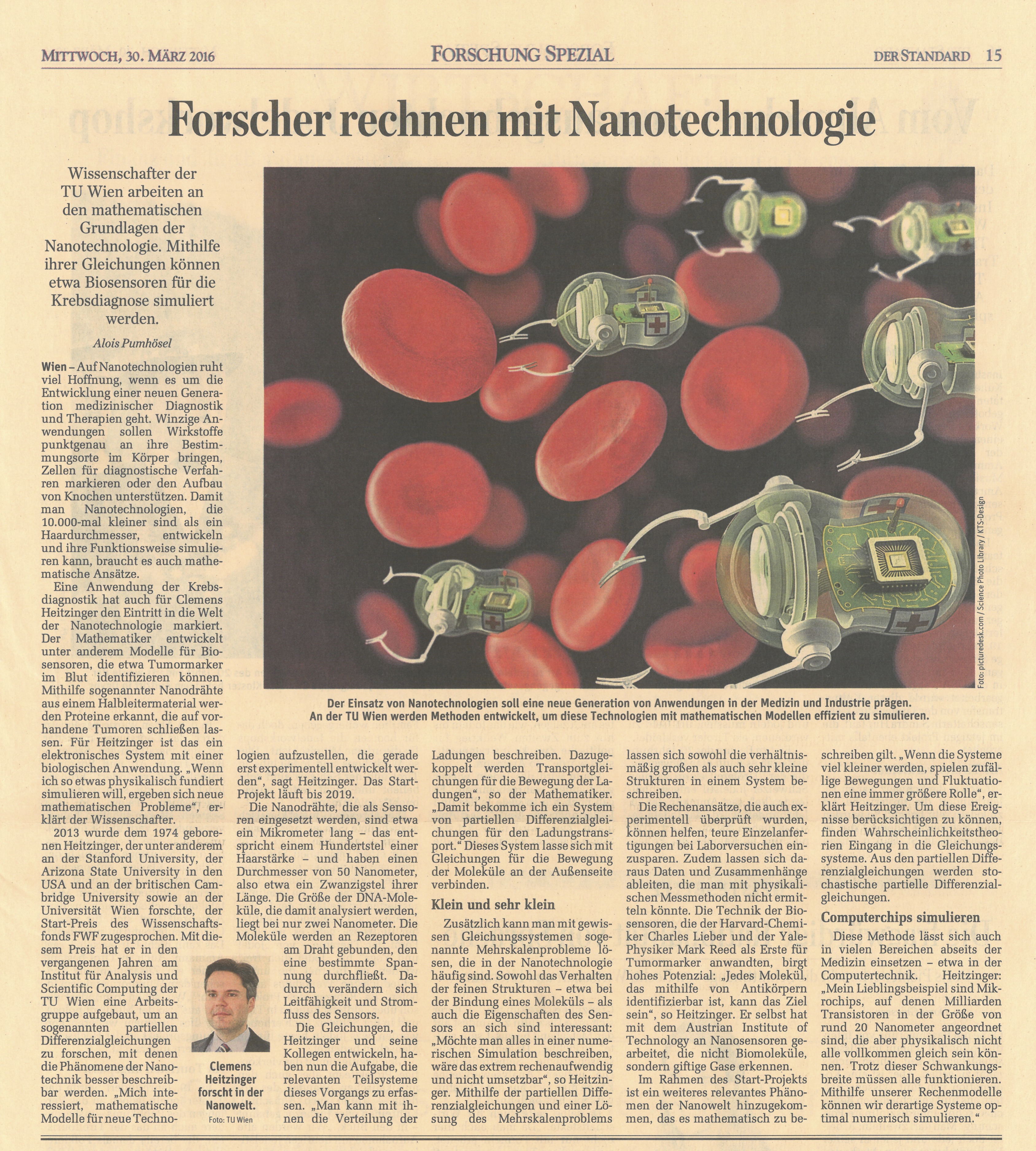
45 Group Photo October 2015
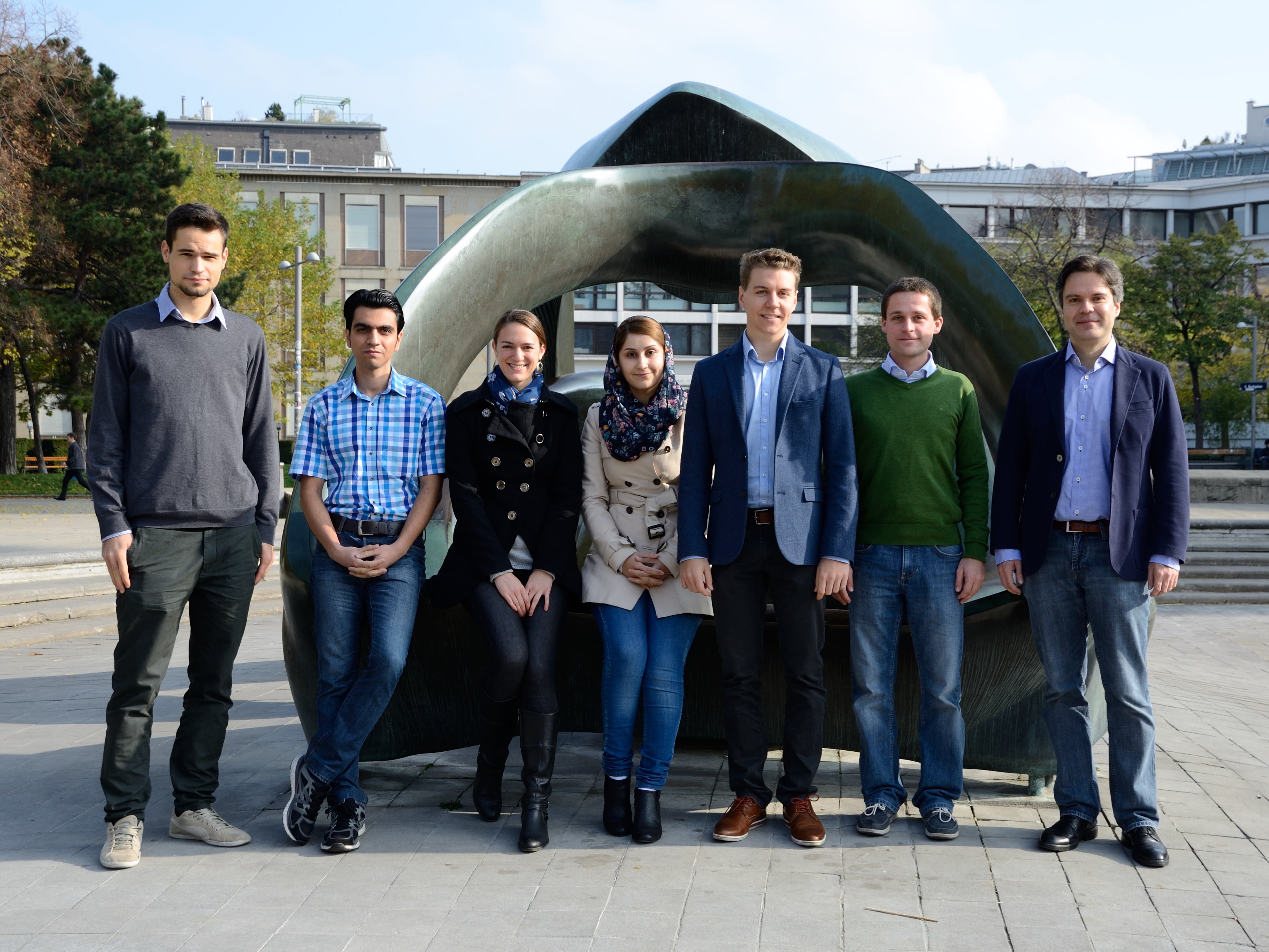
From left to right: Gudmund Pammer, Amirreza Khodadadian, Caroline Geiersbach, Leila Taghizadeh, Benjamin Stadlbauer, Gerhard Tulzer, Clemens Heitzinger. (Not shown: Andreas Buttinger-Kreuzhuber, Gregor Mitscha-Eibl.)
46 Exhibition Wunderkammer 2015 Celebrating 200 Years TU Wien
46.1 The Exhibition
TU Wien celebrated its 200th anniversary on November 6, 2015. To mark the occasion, the exhibition Wunderkammer 2015 was open to the public in TU Wien’s main building in November 2015. Its topic was What’s Next?, bringing together science, technology, and art and familiarizing the general public with new developments. About 100 submissions were received by the organizers of Wunderkammer 2015, and about 30 were selected by a jury of experts. My group presented an overview of our work.
46.2 The Presentation
In addition to actual nanowire gas sensors and posters, we showed this presentation (in German). Special thanks to Benjamin Stadlbauer for preparing the presentation with nice animations and many explanations.
The presentation can be viewed here as a movie file. You can view it full-screen by clicking on the “enlarge” button; the movie file is 1920×1080.
46.3 Press and TV Coverage
This article, Neue Wunderwelten, reports from the exhibition and mentions us. Further articles are here and here.
ORF, Austria’s largest TV station, reported about the opening of the exhibition. Visitors in front of our booth are shown here.
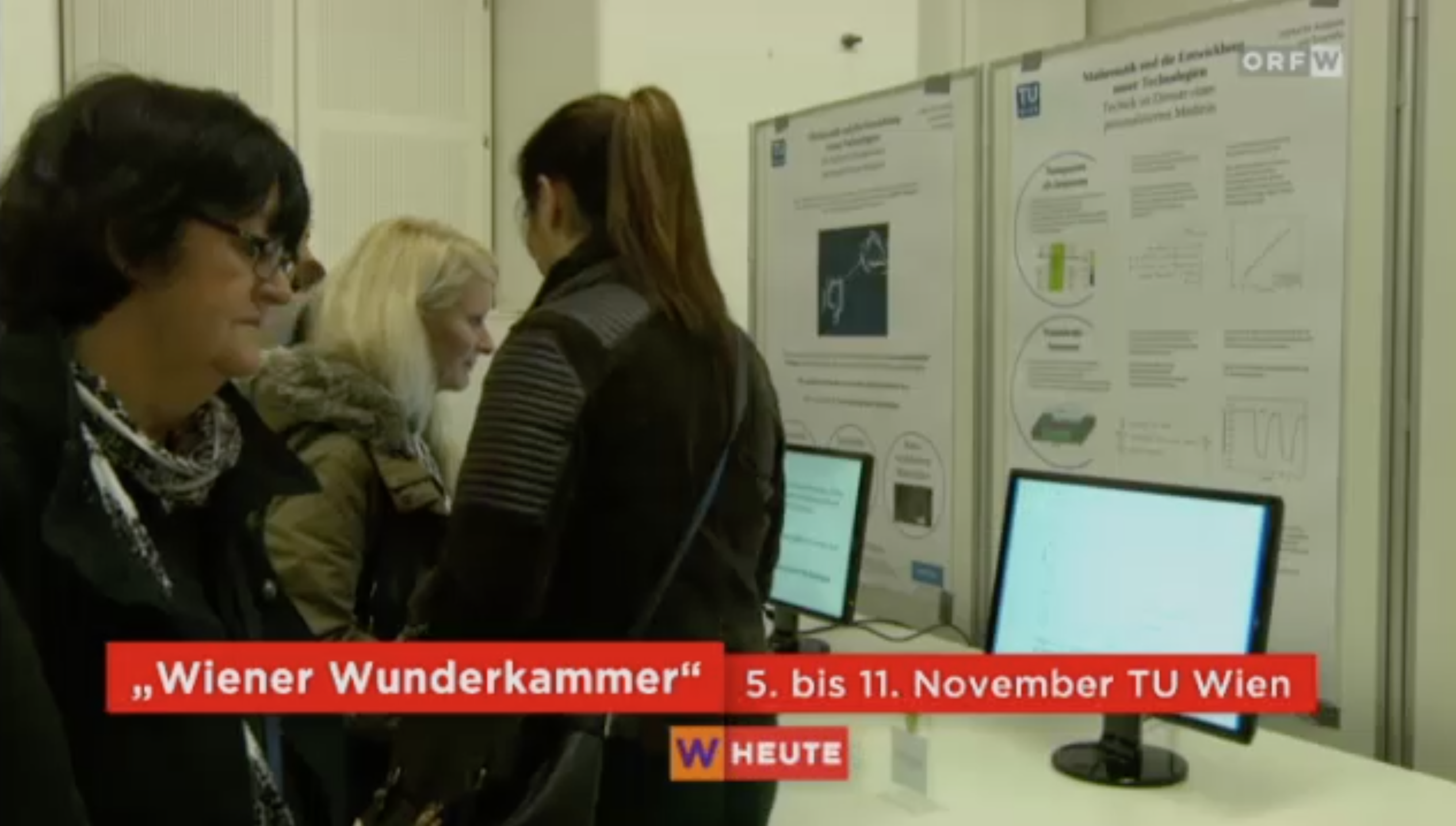
47 Gastkommentar in der Presse über die UG-Novelle (7 Oct 2015)
My comment (Gastkommentar) on the law amendment changing the organization of Austrian universities appeared in the Austrian newspaper Die Presse on 7 October 2015.
48 Another Article about My Work
In May 2015, I was interviewed about my work at TU Wien and the topic of the START Prize: Mathematik für die Nanotechnologie.
49 Article about My Work
In December 2013, I was interviewed about my work and the START Prize: Math researcher earns prestigious START Prize.